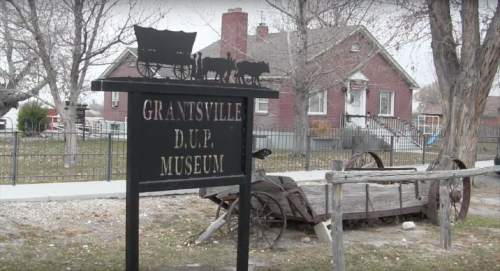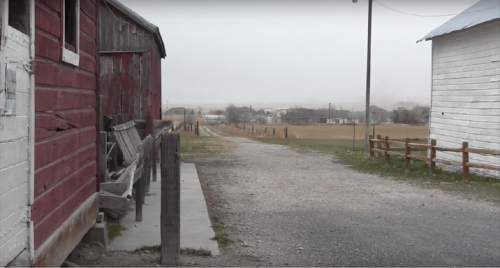This is an archived article that was published on sltrib.com in 2015, and information in the article may be outdated. It is provided only for personal research purposes and may not be reprinted.
Grantsville • Despite concerns from some residents and advocates, the city is moving ahead with plans to turn part of a historic farm originally owned by Mormon apostle and U.S. diplomat J. Reuben Clark into a cemetery.
The city Planning and Zoning Commission voted unanimously last week to grant a conditional-use permit for the city to turn about 6.8 acres of the into a burial ground.
The land, which has been used to grow alfalfa, was part of the city-owned J. Reuben Clark Historic Farm, and members of the nonprofit group Friends of Clark Historic Farm have been working for the past three years to preserve the grounds.
This issue is closed, as far as the city is concerned, unless someone files an appeal.
"We're definitely considering it," Laurie Hurst, president of Friends of Clark Historic Farm, said when asked Tuesday about a possible appeal.
She and others fought unsuccessfully to preserve the farm as much as possible in its original state, with the farmhouse and other buildings surrounded by croplands.
"The vista is definitely important, but we would like to use those fields for things like a pumpkin patch or a corn maze or things that are typical for a heritage attraction like a farm," she said. "Those are things that would bring revenue in to help us run the farm, so for us, it's quite important to keep that farmland and to maintain it as a farm."
Grantsville Mayor Brent Marshall defended the city, saying it has played the biggest role in preserving the historic farm, beginning when local leaders purchased it from a developer a decade ago for $2.2 million and spent additional money to beautify the area.
"In all of these discussions, one thing that keeps coming up is they keep saying that we're going to tear the barns down," he said. "We have never discussed tearing the barns down. Matter of fact, we've done everything we can to keep the barns up."
The J. Reuben Clark Historic Farm is on the National Register of Historic Places. Many of its buildings date back to the 1880s, and the property was purchased in the early 1900s by Clark, who used the farm as his "spiritual retreat" when he wanted to reconnect with his roots.
A Grantsville native, Clark grew into a prominent national figure. He served in seven U.S. presidential administrations and was the U.S. ambassador to Mexico under President Herbert Hoover (1930-1933). He was also an apostle in the LDS Church for 27 years and served in the faith's governing First Presidency. He graduated from the University of Utah and earned his law degree from Columbia. Brigham Young University's law school carries his name.
Grantsville officials bought the farm from Clark's descendants in 2005, and it has been used as a heritage center ever since.
Local leaders met with advocates from the nonprofit group Friday and sold them a 2.2-acre parcel that contains every historic building on the property, except for the museum run by the Daughters of Utah Pioneers.
Marshall also noted that city officials have tried to compromise, reducing the amount of land specified in the rezone from 10 acres to 6.8 acres, an idea that originated from members of the nonprofit.
When they originally acquired the property, Marshall said, local politicians planned to use part of the land for the cemetery, so the move should not have come as a surprise.
More recently, Grantsville leaders have purchased land known as the Wooten property close to the current cemetery, but the area will hold only about 600 plots, and it is estimated the property will not be enough to meet needs into the foreseeable future.
Nonprofit advocates acknowledge rezoning 6.8 acres is better than 10, but they said the compromise still eats up too much of the historic property.
City leaders suggested that a cemetery represents a continued historic use of the property.
"I can't think of anything that represents the history of a community more than a cemetery," said Planning Commissioner Gary Pinkham.
The mayor agreed, adding, "It is a history of the people."
Friends of Clark Historic Farm Vice President Susan Johnsen, in her final plea to planning commissioners, acknowledged their authority to approve the cemetery.
"But just because you have power," she said, "doesn't mean you should always exercise it."
Editor's note: The historic farm is much larger than the 10 acres referred to in the original version of this story. —
View video
Go online to see video about the historic property. › sltrib.com





